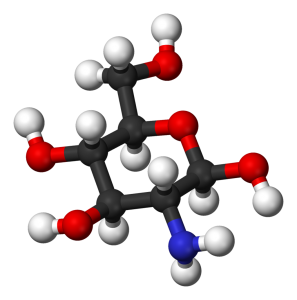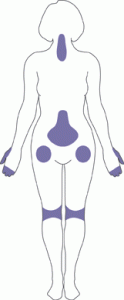Glucosamine seems to relieve joint pain, swelling, and stiffness.

Glucosamine is a natural compound involved in cartilage function and joint health. Supplementing glucosamine may benefit joint health through:
- Improving joint conditions. Glucosamine is considered an effective alternative for combating the consequences of osteoarthritis, including joint pain, swelling, and stiffness, and may even promote healing around joints.
Overview
Glucosamine is a critical precursor to the formation of cartilage, and is naturally found in the fluid surrounding joints. It is also present in the exoskeletons of crustaceans and arthropods, and the cell walls of fungi.
Given these functions, it’s not surprising that glucosamine is best known for its potential to aid joint health. Although not a pharmaceutical drug per se, glucosamine sulfate is commonly used as a supplement ingredient to reduce the symptoms and progression of joint conditions such as arthritis.1
Glucosamine can come in a number of forms, the most prominent ones being glucosamine sulfate, glucosamine hydrochloride, and N-acetyl-glucosamine. For commercial purposes, it is usually made through hydrolysis of shells or fermentation of grains such as wheat or corn.

How Glucosamine May Help With Joint Health
Improving joint conditions
Glucosamine sulfate may be capable not only of reducing joint pain and stiffness, but also minimizing cartilage loss seen in joint conditions and osteoarthritis (OA) in particular.
Glucosamine seems to help maintain joint integrity and function and delay early symptoms of osteoarthritis (OA) primarily by reducing the release of inflammatory molecules.2 In addition, it also displays a chondroprotective effect on knee cartilage.3
Glucosamine Benefits & Uses for Joint Health

As the case with many supplements, there is some controversy surrounding glucosamine research; dozens of studies performed in the mid-90’s were found to be inadequately conducted or heavily biased due to financial backing by glucosamine manufacturers.4 However, newer research has confirmed that glucosamine sulfate does have some benefits.
Most notably, minimizing the consequences of osteoarthritis seems to be the main benefit of glucosamine, but other potential effects include:
- Relieving joint pain, swelling, and stiffness.
- Reducing joint damage from osteoarthritis.
- Enhancing healing after sprains and strains.
- Reinforcing joint cartilage.
- Slowing the effects of aging on joints.
Research
Animal Research
Animal studies – with a focus on cows, horses, and dogs – indicates that glucosamine may be able to:
- Sustain joint integrity and function through reducing inflammation. Glucosamine was shown to protect bovine joint cartilage tissue from degradation.5
- Combat joint cartilage breakdown. Glucosamine was found to reduce joint cartilage degradation in osteoarthritic horses.6
Human Research
Clinical research shows that glucosamine sulfate is capable of improving hip and knee movement as well as alleviating symptoms of osteoarthritis, including pain, stiffness, function, and joint narrowing.
Glucosamine (1500 mg) may improve knee mobility
In this randomized, double-blind, placebo-controlled investigation, 106 athletes with knee injury were given either placebo or 1500 mg of glucosamine sulfate daily for 4 weeks. The glucosamine group showed significant improvement in knee mobility (flexing and extending) and range of motion compared to the placebo. No significant differences were found in pain intensity or knee swelling.
- The study concluded that “after 28 days of treatment the patients from the glucosamine group demonstrated significant improvement in knee flexion and extension as compared with the placebo group.”7
Glucosamine (1500 mg) may reduce knee pain and improve function in people with osteoarthritis
In this randomized, placebo-controlled, double-blind investigation, 318 people with knee osteoarthritis were given placebo, 3 grams of acetaminophen, or 1500 mg of glucosamine sulfate every day for 6 months. Glucosamine sulfate was found to be more effective at improving knee function and decreased pain by 40% compared to the 21% for placebo.
- The study concluded that “glucosamine sulfate at the oral once-daily dosage of 1,500 mg is more effective than placebo in treating knee OA symptoms.”8
In this randomized, placebo-controlled, double-blind investigation, 202 patients with knee osteoarthritis were given either 1500 mg of glucosamine sulfate or placebo once a day for 3 years. The glucosamine sulfate group had fewer severe narrowings of joint space (5% vs 14%) and improvement of symptoms including pain, function, and stiffness.
- The study concluded that “long-term treatment with glucosamine sulfate retarded the progression of knee osteoarthritis, possibly determining disease modification.”9
Glucosamine (1500 mg) may limit the progression of osteoarthritis
In this randomized, double-blind, placebo controlled investigation, 212 patients with knee osteoarthritis were given placebo or 1500 mg of glucosamine sulfate every day for a 3-year period. Symptoms of osteoarthritis were less pronounced in the glucosamine group, in addition to improvement of joint-space loss.
- The study concluded that “long-term combined structure-modifying and symptom-modifying effects of gluosamine sulphate suggest that it could be a disease modifying agent in osteoarthritis.”10
Dosage for Joint Health
- Research studies generally use 1500 mg of glucosamine sulfate
- Typical supplemental capsules range from 300 – 500 mg, 3 times daily with food
Supplements in Review Says
- Glucosamine sulfate, 1500 mg for joint health.
Glucosamine may relieve arthritis pain, stiffness, and swelling. We recommend glucosamine as a supplement that helps reduce joint pain, stiffness and swelling, especially when it’s caused by osteoarthritis.
Glucosamine sulfate seems to be the most effective form. Among the three main forms of supplemental glucosamine, glucosamine sulfate seems to be the best option.
Leave a Reply